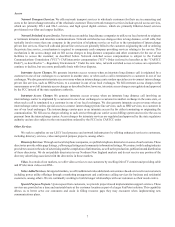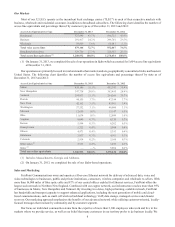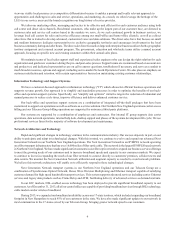FairPoint Communications 2013 Annual Report Download - page 19
Download and view the complete annual report
Please find page 19 of the 2013 FairPoint Communications annual report below. You can navigate through the pages in the report by either clicking on the pages listed below, or by using the keyword search tool below to find specific information within the annual report.17
apply generally to ILECs, these Bell Operating Company-specific requirements mandate access to certain facilities (such as certain
types of local loops and inter-office transport and local circuit switching) even where other carriers would not be "impaired" without
them.
Our Telecom Group rural operations are exempt from the additional ILEC requirements until the applicable rural carrier
receives a bona fide request for these additional services and the applicable state authority determines that the request is not unduly
economically burdensome, is technically feasible and is consistent with the universal service objectives set forth in the 1996 Act.
This exemption is effective for all of the Telecom Group operations, except in Florida where the legislature has determined that
all ILECs are required to provide the additional services as prescribed in the 1996 Act. Loss of a rural exemption by one or more
of the Telecom Group operating companies could be achieved if the state commission grants such a petition filed by a competitor.
Loss of the rural exemption would potentially expose the operation to additional local competition.
Long Distance Operations
The FCC has required that ILECs that provide interstate long distance services originating from their local exchange service
territories must do so in accordance with "non-structural separation" rules. These rules have required that our long distance affiliates
(i) maintain separate books of account, (ii) not own transmission or switching facilities jointly with the local exchange affiliate
and (iii) acquire any services from their affiliated LEC at tariffed rates, terms and conditions. Our Northern New England operations,
which are Bell Operating Companies, are subject to a different set of rules allowing them to offer both long distance and local
exchange services in the regions where they operate as Bell Operating Companies, subject to certain conditions with which we
comply. Not all of our competitors must comply with these requirements. Therefore, these requirements may put us at a competitive
disadvantage in the interstate long distance market.
Other Obligations under Federal Law
We are subject to a number of other statutory and regulatory obligations at the federal level. For example, the Communications
Assistance for Law Enforcement Act ("CALEA") requires telecommunications carriers to modify equipment, facilities and services
to allow for authorized electronic surveillance based on either industry or FCC standards. Under CALEA and other federal laws,
we may be required to provide law enforcement officials with call records, content or call identifying information, pursuant to an
appropriate warrant or subpoena.
The FCC limits how carriers may use or disclose customer proprietary network information ("CPNI") and specifies what
carriers must do to safeguard CPNI provided to third parties. Congress, as well as some state legislatures, has enacted legislation
to criminalize the unauthorized sale of call detail records and to further restrict the manner in which carriers make such information
available.
In addition, if we seek in the future to acquire companies that hold FCC authorizations, in most instances we will be required
to seek approval from the FCC prior to completing those acquisitions. The FCC has broad authority to condition, modify, cancel,
terminate or revoke operating authority for failure to comply with applicable federal laws or rules, regulations and policies of the
FCC. Fines or other penalties also may be imposed for such violations.
Broadband and Internet Regulation
A Verizon petition asking the FCC to forbear from applying common carrier regulation to certain broadband services sold
primarily to larger business customers was deemed granted by operation of law on March 19, 2006 when the FCC did not deny
the petition by the statutory deadline. The U.S. Court of Appeals for the District of Columbia Circuit has rejected a challenge to
that outcome. The forbearance deemed granted to Verizon has been extended to our Northern New England operations by the FCC
in its order approving the Merger. In October 2007, the FCC stated its intention to define more precisely the scope of forbearance
obtained by Verizon, but it has not yet done so. On October 4, 2011, tw telecom, inc. filed a petition with the FCC asking it to
reverse the forbearance granted to Verizon by operation of law on March 19, 2006. Comments have been filed in this proceeding
by FairPoint and other parties. Following reply comments, the FCC may issue an order on this petition. A similar petition was
filed by a group of competing LECs on November 2, 2012 and has been put out for comment by the FCC. We do not know how
this will be resolved or the impact it may have on us if the FCC reversed, eliminated or modified the forbearance granted to Verizon
in 2006.
The FCC has imposed particular regulatory obligations on IP-based telephony. It has concluded that interconnected VoIP
providers must comply with CALEA; provide enhanced 911 emergency calling capabilities; comply with certain disability access
requirements; comply with the FCC's rules protecting CPNI; provide local number portability; and pay regulatory fees. Recently
there have also been discussions among policy makers concerning "net neutrality." The FCC released a statement of net neutrality
principles favoring customer choice of content and services available over broadband networks. It has adopted open Internet access
rules applicable to all broadband Internet access providers. On January 14, 2014, the DC Circuit Court of Appeals (the "DC Court")
























